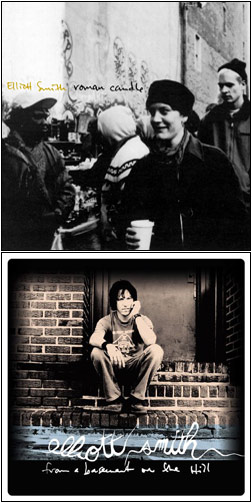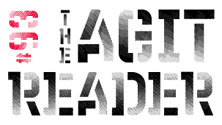
Roman Candle and From a Basement on the Hill
Kill Rock Stars
It’s been more than six years since Elliott Smith died, and yet the potency of the music he created has hardly diminished. There remains something remarkably powerful about the insular realm his songs occupied, one built from hushed tones, supple harmonies, and confessions lightly obscured with cleverness. Smith had the uncommon ability to be delicate without being wimpy and poppy without sacrificing candor. While he pulled from various inspirations, not the least of which was the DIY environs from which he sprang, what he created was truly singular, and remains so, even amongst the hordes of also-rans to follow in his wake.
And while there has been a couple posthumous releases, his catalog has (thankfully) been treated with respect and restraint rather than chopped up and repackaged to exploit his legacy. Kill Rock Stars, the label where Smith made his name before he moved up to the majors by signing to Dreamworks, has acquired his other indie releases—his debut, 1994’s Roman Candle (originally released by Cavity Search), and From a Basement on the Hill, the album Smith was working on at the time of his death (originally issued in 2004 by Anti)—and reissued them last week. It seems the main impetus here has merely been to keep the albums in circulation.
Roman Candle, which with this reissue is now out on vinyl for the first time (in the U.S.), has always been my least favorite of Smith’s albums. Lyrically, he hadn’t quite come into his own yet, and while the feathery fingerpicking that highlighted his subsequent releases was already developed, the songs lack the melodic hooks of his later work, instead relying on simple blues chord progressions. Smith was often compared to Nick Drake (and that he ultimately died young too seems to have validated this comparison), and Roman Candle is very much his Five Leaves Left (Drake’s debut). Remastered by Larry Crane, the album’s best qualities are further pronounced, and it’s easier to appreciate its however germinating attributes. The plaintive tone of “No Name #4” points to the future, as does “No Name #1” and its tale of social misfits.
Listening to Roman Candle and From a Basement on the Hill together turns out to make a lot of sense, despite the decade separating their original releases. Smith’s final music, Basement shares Candle’s recollection of the blues (as filtered through 40 years of modification). The bent notes of opener “Coast to Coast,” however warped, show this, and the psychic pain of “Strung Out Again” is nothing if not the blues. But the record also shows the artistry, as both a musician and as a songwriter, that Smith had honed during the intervening years. “Let’s Get Lost” balances intricacy and melody in silken reverie, and “A Fond Farewell” puts a reflexive lyrical approach to good use. One is tempted to try to read between each and every line to figure out Elliott’s headspace at the time of his demise. But each record he made was born from some stored misery—not simply pulled from his diary—and put to good use in his poignant songs. The intimacy of the songs makes it tempting to treat the music and the man as one, but the very fact that Smith’s songs still resonate demonstrates that he created something much more than simply a collective self-portrait.
Stephen Slaybaugh
PAST PERFECTS
Black Tambourine, Black Tambourine
Paul Revere & the Raiders, The Complete Columbia Singles
The Jon Spencer Blues Explosion, Dirty Shirt Rock 'n' Roll: The First Ten Years
The Plimsouls, Live! Beg, Borrow & Steal
Pavement, Quarantine the Past
Fela Kuti, "Chop 'n' Quench" Batch
Buzzcocks, Another Music in a Different Kitchen, Love Bites, and A Different Kind of Tension
Frank Sinatra, Strangers in the Night
Next Stop... Soweto
Good God! Born Again Funk
Animal Collective, Campfire Songs
13th Chime, The Lost Album
Tin Huey, Before Obscurity: The Bushflow Tapes
Jawbox, For Your Own Special Sweetheart
